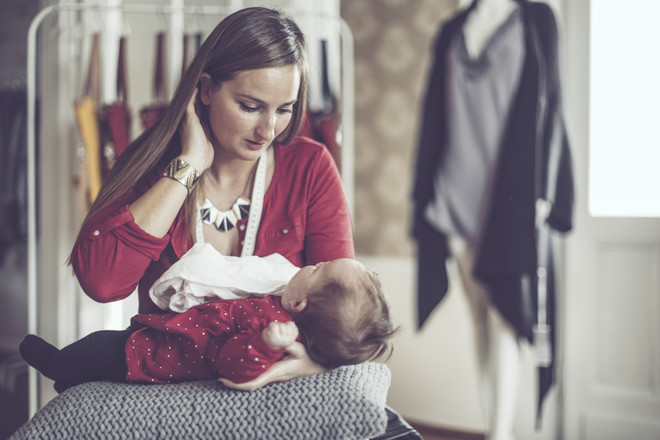Woman's Day decided to get a competent answer to thethis burning question and turned to Marina Trotsky, a consultant on HB, an expert of the Prognosis Project, a member of the Union of Professional Maternity Support (SPPM). A photo: Getty "No amount of string to curl, there will still be a tip," my mother liked to say. So, no matter how much you breastfeed, and this period of your life with the child will end. How once the expectation of pregnancy ended, and then pregnancy itself. So, the period of the newborn has changed to infancy, and now you are thinking about the time when your child will not need breastfeeding. How can you understand that this time has already come? Who can say with all certainty that it is time to wean from the breast? There are different points of view on this question. Someone thinks that the best option is when breastfeeding gradually comes to naught, simply because the baby ceases to need it. Here, numerous scientific studies are taken into account. They talk about the positive effect of prolonged breastfeeding on the immunity and overall health of the baby, on the development of mental abilities and neuropsychological development. This option is suitable for parents who know that breastfeeding is not only food, but also communication, comfort and much more. With this approach, the age of the baby at the time of breastfeeding can be a year, and three, and five. There are those who focus on the recommendations of the World Health Organization and complete breastfeeding for about two years.
A photo: Getty "No amount of string to curl, there will still be a tip," my mother liked to say. So, no matter how much you breastfeed, and this period of your life with the child will end. How once the expectation of pregnancy ended, and then pregnancy itself. So, the period of the newborn has changed to infancy, and now you are thinking about the time when your child will not need breastfeeding. How can you understand that this time has already come? Who can say with all certainty that it is time to wean from the breast? There are different points of view on this question. Someone thinks that the best option is when breastfeeding gradually comes to naught, simply because the baby ceases to need it. Here, numerous scientific studies are taken into account. They talk about the positive effect of prolonged breastfeeding on the immunity and overall health of the baby, on the development of mental abilities and neuropsychological development. This option is suitable for parents who know that breastfeeding is not only food, but also communication, comfort and much more. With this approach, the age of the baby at the time of breastfeeding can be a year, and three, and five. There are those who focus on the recommendations of the World Health Organization and complete breastfeeding for about two years.  Photo:Getty Many mothers are guided by their child's willingness to be weaned. Eats complementary foods well, knows how to fall asleep and be comforted without a breast, sleeps all night without waking up - this means that you can gently curtail the process. In this case, it is important to take into account the readiness of the mother herself. If the breast does not overflow without latching for six hours or longer, then it will be much easier for you than in a situation where hot flashes still occur quite often. Few parents are sure that you need to breastfeed for no longer than a year. Their arguments are that a longer period of breastfeeding leads to an excessive psychological dependence of the child on the mother, the inability of the child to console herself, and negatively affects the woman's health. Affirmations Some other moms use intuition when deciding to end breastfeeding. Others - by their own fatigue from feeding. Once I heard a funny opinion that there is a small period, literally a few days (at the age of about a year), when the baby suddenly loses interest in the breast. And if the mother cannot track this moment, she will have to breastfeed for a long time and painfully, until about adulthood. As you can see, there are no clear and generally accepted criteria by which you can know that it is time to wean your baby. As a rule, this is a matter of your knowledge, beliefs and maternal instinct. Strive to ensure that your decision is not spontaneous and momentary. Weigh all the factors. Consider how your life with your baby might change if you stop breastfeeding now. If possible, consult with a breastfeeding specialist and make a personalized plan for completing breastfeeding or do it yourself. And go for it! Good luck! Attention! When completing breastfeeding, be careful with your body. Remember that tightening your breasts or restricting food and drink to reduce milk supply can harm you, as can medication to stop lactation. In almost 100% of cases, it is possible to stop the production of breast milk without medication, and even more so without the outdated methods used by our great-grandmothers! Take care of your health Read also: When did you end breastfeeding?
Photo:Getty Many mothers are guided by their child's willingness to be weaned. Eats complementary foods well, knows how to fall asleep and be comforted without a breast, sleeps all night without waking up - this means that you can gently curtail the process. In this case, it is important to take into account the readiness of the mother herself. If the breast does not overflow without latching for six hours or longer, then it will be much easier for you than in a situation where hot flashes still occur quite often. Few parents are sure that you need to breastfeed for no longer than a year. Their arguments are that a longer period of breastfeeding leads to an excessive psychological dependence of the child on the mother, the inability of the child to console herself, and negatively affects the woman's health. Affirmations Some other moms use intuition when deciding to end breastfeeding. Others - by their own fatigue from feeding. Once I heard a funny opinion that there is a small period, literally a few days (at the age of about a year), when the baby suddenly loses interest in the breast. And if the mother cannot track this moment, she will have to breastfeed for a long time and painfully, until about adulthood. As you can see, there are no clear and generally accepted criteria by which you can know that it is time to wean your baby. As a rule, this is a matter of your knowledge, beliefs and maternal instinct. Strive to ensure that your decision is not spontaneous and momentary. Weigh all the factors. Consider how your life with your baby might change if you stop breastfeeding now. If possible, consult with a breastfeeding specialist and make a personalized plan for completing breastfeeding or do it yourself. And go for it! Good luck! Attention! When completing breastfeeding, be careful with your body. Remember that tightening your breasts or restricting food and drink to reduce milk supply can harm you, as can medication to stop lactation. In almost 100% of cases, it is possible to stop the production of breast milk without medication, and even more so without the outdated methods used by our great-grandmothers! Take care of your health Read also: When did you end breastfeeding?
- I did not have any luck at all ...
- In the first months
- Closer to half a year
- Closer to the year
- Closer to one and a half years
- Closer to two years
- Almost 3 years
- Feeding the child before school
- My version will write in the comments
Voted: 190When did you finish breastfeeding?
- At me with it at all was not taken ... 4,2%
- In the first months, 3.2%
- Nearer half of the year, 6.3%
- Closer to the year19.5%
- Closer to one and a half years, 22.6%
- Closer to two years, 17.9%
- Almost in 3 years, 12.1%
- She nursed her child to school.7,7%
- My version will write in the comments of 9.5%
Voted: 190









